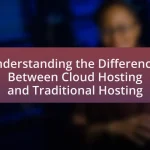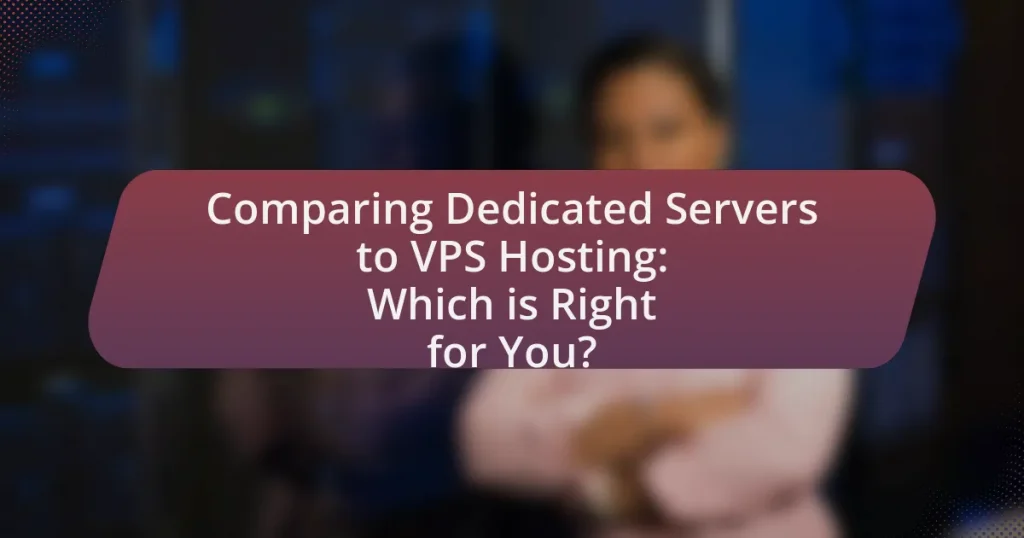Dedicated servers and VPS (Virtual Private Server) hosting are two distinct hosting solutions that cater to different business needs. Dedicated servers provide exclusive access to a physical server, offering enhanced performance, security, and complete control, making them ideal for high-traffic websites and resource-intensive applications. In contrast, VPS hosting divides a single physical server into multiple virtual servers, allowing for cost-effective resource allocation and scalability, suitable for businesses with moderate demands. This article compares the features, advantages, and limitations of both hosting types, helping users determine the best option based on their specific requirements, including performance, budget, and control needs.
What are Dedicated Servers and VPS Hosting?
Dedicated servers are physical servers exclusively allocated to a single user or organization, providing complete control over the server’s resources, configuration, and security. This setup is ideal for businesses with high traffic demands or specific compliance requirements, as it offers enhanced performance and reliability compared to shared hosting environments.
VPS (Virtual Private Server) hosting, on the other hand, involves a single physical server being divided into multiple virtual servers, each with its own operating system and allocated resources. VPS hosting offers a balance between cost and performance, making it suitable for businesses that require more control and flexibility than shared hosting but do not need the full resources of a dedicated server.
Both dedicated servers and VPS hosting provide distinct advantages depending on the specific needs of the user, such as performance, scalability, and budget considerations.
How do Dedicated Servers differ from VPS Hosting?
Dedicated servers provide an entire physical server dedicated to a single user, while VPS hosting utilizes virtualization technology to partition a single physical server into multiple virtual servers, each allocated to different users. This means that dedicated servers offer complete control over the server environment, including hardware and software configurations, which is ideal for resource-intensive applications. In contrast, VPS hosting shares the underlying hardware resources among multiple users, leading to potentially lower performance and limited customization options. The distinction is significant, as dedicated servers are typically more expensive but offer superior performance and security, while VPS hosting is more cost-effective and suitable for smaller projects or businesses with moderate resource needs.
What are the key features of Dedicated Servers?
Dedicated servers offer several key features, including complete resource allocation, enhanced performance, and high levels of security. These servers provide dedicated CPU, RAM, and storage, ensuring that all resources are exclusively available for a single user or organization, which leads to improved performance and reliability. Additionally, dedicated servers allow for full control over server configurations and software installations, enabling customization to meet specific needs. Security is significantly heightened due to the isolation from other users, reducing the risk of data breaches and attacks. According to a report by HostingAdvice, dedicated servers are often preferred for high-traffic websites and applications that require robust performance and security measures.
What are the key features of VPS Hosting?
The key features of VPS Hosting include dedicated resources, scalability, root access, and enhanced security. VPS Hosting allocates specific amounts of CPU, RAM, and storage to each virtual server, ensuring consistent performance. Scalability allows users to easily upgrade resources as their needs grow, making it suitable for businesses with fluctuating demands. Root access provides complete control over the server environment, enabling users to install custom software and configure settings. Enhanced security measures, such as isolated environments and dedicated IP addresses, protect against vulnerabilities and attacks, making VPS Hosting a reliable choice for many users.
What are the advantages of using Dedicated Servers?
Dedicated servers offer several advantages, including enhanced performance, complete control, and improved security. The dedicated resources of a server ensure optimal performance for high-traffic websites or applications, as there are no resource-sharing issues that can occur with other hosting types. Additionally, users have full administrative access, allowing for customized configurations and software installations tailored to specific needs. Security is also significantly heightened, as dedicated servers are less susceptible to attacks that can affect shared environments, providing a more robust defense against potential threats. These factors collectively make dedicated servers a preferred choice for businesses requiring reliability and scalability.
How does performance compare between Dedicated Servers and VPS Hosting?
Dedicated servers generally offer superior performance compared to VPS hosting. This is due to dedicated servers providing exclusive access to all hardware resources, resulting in higher processing power, memory, and storage capabilities. In contrast, VPS hosting allocates a portion of the server’s resources to multiple users, which can lead to performance variability based on the demands of other virtual servers. For instance, dedicated servers can handle high-traffic websites and resource-intensive applications more effectively, while VPS may struggle under similar loads due to shared resources.
What security benefits do Dedicated Servers offer?
Dedicated servers offer enhanced security benefits due to their exclusive resources and isolated environment. This isolation minimizes the risk of data breaches and attacks that can occur in shared environments, as no other users can access the server’s resources. Additionally, dedicated servers allow for customized security configurations, enabling businesses to implement specific firewalls, intrusion detection systems, and security protocols tailored to their needs. According to a study by the Ponemon Institute, organizations using dedicated servers reported a 30% lower risk of data breaches compared to those using shared hosting solutions, reinforcing the security advantages of dedicated servers.
What are the advantages of using VPS Hosting?
VPS hosting offers several advantages, including enhanced performance, cost-effectiveness, and greater control compared to shared hosting. Enhanced performance is achieved through dedicated resources, which means that users experience faster load times and improved reliability. Cost-effectiveness is evident as VPS hosting typically costs less than dedicated servers while still providing many of the same benefits, making it an attractive option for businesses with budget constraints. Greater control is facilitated by root access, allowing users to customize their server environment and install specific software as needed. These advantages make VPS hosting a suitable choice for businesses looking for a balance between performance and cost.
How does cost-effectiveness play a role in choosing VPS Hosting?
Cost-effectiveness is a crucial factor in choosing VPS Hosting because it provides a balance between performance and affordability. VPS Hosting typically offers dedicated resources at a lower price point compared to dedicated servers, making it an attractive option for businesses that require reliability without the high costs associated with full server ownership. For instance, VPS plans can start as low as $20 per month, while dedicated servers often exceed $100 monthly, demonstrating significant savings. This cost advantage allows businesses to allocate resources more efficiently, invest in other areas, and scale their operations without incurring prohibitive expenses.
What scalability options does VPS Hosting provide?
VPS Hosting provides several scalability options, including vertical scaling, which allows users to increase resources such as CPU, RAM, and storage as needed, and horizontal scaling, which enables the addition of more VPS instances to handle increased traffic or workload. This flexibility is crucial for businesses experiencing growth or fluctuating demands, as it allows for efficient resource management without the need for significant infrastructure changes. Additionally, many VPS providers offer automated scaling solutions that can adjust resources in real-time based on usage metrics, ensuring optimal performance and cost-effectiveness.
What factors should you consider when choosing between Dedicated Servers and VPS Hosting?
When choosing between Dedicated Servers and VPS Hosting, consider performance, cost, scalability, and management. Dedicated Servers offer superior performance due to exclusive resources, making them ideal for high-traffic websites or resource-intensive applications. In contrast, VPS Hosting provides a more cost-effective solution with shared resources, suitable for smaller businesses or projects with moderate traffic. Scalability is another factor; Dedicated Servers require more time and investment to upgrade, while VPS Hosting allows for easier resource adjustments as needs change. Lastly, management varies; Dedicated Servers often require more technical expertise for maintenance, whereas VPS Hosting typically includes managed services, making it easier for users with less technical knowledge.
How does your website’s traffic influence your choice?
Website traffic significantly influences the choice between dedicated servers and VPS hosting. High traffic levels typically necessitate dedicated servers due to their superior performance, scalability, and resource allocation, which can handle increased user demands without compromising speed or reliability. In contrast, VPS hosting may suffice for lower traffic volumes, offering a cost-effective solution with adequate resources for moderate usage. According to a study by HostingAdvice, websites experiencing over 10,000 monthly visitors often benefit from dedicated servers, as they provide enhanced security and control, essential for maintaining optimal performance during peak traffic periods.
What are the implications of high traffic on server performance?
High traffic significantly impacts server performance by increasing resource consumption and potentially leading to slower response times. When a server experiences high traffic, it must handle more simultaneous requests, which can strain CPU, memory, and bandwidth resources. This strain often results in slower load times, increased latency, and, in extreme cases, server crashes or downtime. For instance, a study by Akamai found that a 100-millisecond delay in load time can reduce conversion rates by 7%. Therefore, managing high traffic effectively is crucial for maintaining optimal server performance and user experience.
How can traffic patterns affect your hosting costs?
Traffic patterns significantly influence hosting costs by determining the amount of resources required to manage website traffic. Higher traffic volumes necessitate more bandwidth, storage, and processing power, which can lead to increased costs, especially with hosting plans that charge based on resource usage. For instance, a website experiencing peak traffic may require a dedicated server to handle the load efficiently, while a site with consistent low traffic might operate effectively on a VPS, which is generally more cost-effective. Additionally, hosting providers often implement tiered pricing models based on traffic levels; thus, fluctuating traffic patterns can lead to variable monthly expenses.
What level of control do you need over your server?
The level of control needed over a server depends on the specific requirements of the user or organization. For instance, dedicated servers offer complete control over the hardware and software configurations, allowing for custom installations and optimizations, which is essential for businesses with unique needs or high-security requirements. In contrast, VPS hosting provides a moderate level of control, where users can manage their virtual environment but share physical resources with others, making it suitable for those who need flexibility without the overhead of managing a dedicated server. This distinction is crucial for determining the appropriate hosting solution based on the desired level of server management and customization.
How does Dedicated Server management differ from VPS management?
Dedicated Server management differs from VPS management primarily in the level of control and resource allocation. In Dedicated Server management, users have complete control over an entire physical server, allowing for customized configurations, dedicated resources, and enhanced security. In contrast, VPS management involves a virtualized environment where multiple users share the same physical server, leading to limited control over the server’s overall configuration and resources. This distinction is significant because Dedicated Servers are often preferred for high-performance applications requiring maximum resources, while VPS is suitable for users needing cost-effective solutions with moderate resource demands.
What are the customization options available for each type of hosting?
Dedicated servers offer extensive customization options, including hardware specifications such as CPU, RAM, storage type, and network configurations, allowing users to tailor the server to specific performance needs. VPS hosting provides moderate customization options, enabling users to select the operating system, allocate resources like CPU and RAM, and install specific software applications, but with limitations compared to dedicated servers due to shared resources. These distinctions highlight that dedicated servers are ideal for users requiring maximum control and performance, while VPS hosting suits those needing flexibility within a constrained environment.
What are the potential drawbacks of each hosting option?
Dedicated servers can be costly and require technical expertise for management, which may not be feasible for all users. The high expense is due to the exclusive resources and hardware, making it less accessible for small businesses or startups. Additionally, the need for advanced technical skills can lead to increased operational challenges, as users must handle server maintenance, security, and updates independently.
VPS hosting, while more affordable, can suffer from resource limitations and potential performance issues due to shared resources among multiple users. The shared environment means that if one user experiences high traffic, it can impact the performance of others on the same server. Furthermore, VPS hosting may not provide the same level of customization and control as dedicated servers, limiting advanced users who require specific configurations for their applications.
What are the limitations of Dedicated Servers?
Dedicated servers have several limitations, including high costs, lack of scalability, and maintenance responsibilities. The high costs associated with dedicated servers can be prohibitive for small businesses, as they require significant upfront investment and ongoing expenses for hardware and management. Additionally, dedicated servers lack scalability; once the server is set up, upgrading resources often involves purchasing new hardware rather than simply adjusting settings, which can lead to downtime. Furthermore, the responsibility for server maintenance falls entirely on the user, requiring technical expertise and time to manage updates, security, and troubleshooting, which can be a burden for those without IT resources.
What are the limitations of VPS Hosting?
VPS hosting has several limitations, including resource allocation, performance variability, and management complexity. Resource allocation can be restrictive, as users share physical server resources with other VPS instances, which may lead to performance degradation during peak usage times. Performance variability arises from the unpredictable nature of shared resources, where one VPS can impact the performance of others on the same server. Additionally, management complexity increases as users are often responsible for server maintenance, security updates, and software installations, which may require technical expertise. These factors can limit the effectiveness of VPS hosting for businesses with high resource demands or those lacking technical skills.
How can you make the best choice for your needs?
To make the best choice for your needs between dedicated servers and VPS hosting, assess your specific requirements such as performance, scalability, and budget. Dedicated servers offer maximum performance and control, ideal for high-traffic websites or applications requiring significant resources. In contrast, VPS hosting provides a more cost-effective solution with sufficient resources for medium-sized projects, allowing for scalability as your needs grow. According to a study by HostingAdvice, 70% of businesses prefer VPS for its balance of cost and performance, while dedicated servers are favored by 80% of enterprises with high resource demands.
What are the best practices for evaluating your hosting needs?
To evaluate your hosting needs effectively, begin by assessing your website’s traffic and resource requirements. Understanding the expected number of visitors and the type of content you will host is crucial; for instance, a site with high traffic and resource-intensive applications may require dedicated servers, while a smaller site may function well on VPS hosting.
Next, consider your budget and the cost-effectiveness of different hosting options. Dedicated servers typically incur higher costs due to their exclusive resources, while VPS hosting offers a more affordable solution with shared resources.
Additionally, evaluate the level of control and customization you need. Dedicated servers provide full control over the server environment, which is essential for specific configurations, whereas VPS hosting offers a balance of control and ease of management.
Finally, assess the level of technical support you require. Dedicated hosting often comes with premium support options, while VPS hosting may offer varying levels of support depending on the provider.
By analyzing these factors—traffic expectations, budget constraints, control needs, and support requirements—you can make an informed decision about the most suitable hosting solution for your specific situation.
How can you assess your current and future resource requirements?
To assess your current and future resource requirements, begin by analyzing your existing workload and performance metrics. This involves evaluating CPU usage, memory consumption, and storage needs over a defined period, which can be done using monitoring tools that provide insights into resource utilization patterns. Additionally, project future growth by considering factors such as anticipated traffic increases, application scaling, and business expansion plans. Historical data can inform these projections, allowing for a more accurate estimation of future needs. For instance, if your website traffic has grown by 30% annually, you can forecast similar growth and adjust your resource allocation accordingly.
What tools can help you analyze your hosting performance?
Tools that can help analyze hosting performance include Google PageSpeed Insights, GTmetrix, and Pingdom. Google PageSpeed Insights evaluates the speed and performance of web pages, providing actionable recommendations for improvement. GTmetrix combines Google Lighthouse and WebPageTest to offer detailed insights into page load times and performance metrics. Pingdom monitors website uptime and performance, delivering real-time data on load times and user experience. These tools are widely used in the industry, with Google PageSpeed Insights reporting that optimizing page speed can lead to a 20% increase in conversion rates.
What tips can help you transition smoothly between hosting types?
To transition smoothly between hosting types, assess your current and future needs, ensuring that the new hosting type aligns with your website’s requirements. Conduct a thorough evaluation of resource usage, such as CPU, RAM, and bandwidth, to determine if the new hosting type can accommodate your traffic and performance demands. Additionally, plan the migration process carefully by creating a backup of your data and testing the new environment before fully switching over. This approach minimizes downtime and data loss, which is crucial for maintaining user experience and SEO rankings.
How can you prepare for migration from VPS to Dedicated Server?
To prepare for migration from a VPS to a Dedicated Server, first, conduct a thorough assessment of your current VPS environment, including resource usage, application dependencies, and data storage needs. This assessment allows for a clear understanding of the requirements for the dedicated server, ensuring that it meets or exceeds the performance and capacity of the VPS.
Next, create a detailed migration plan that outlines the steps for transferring data, applications, and configurations. This plan should include a timeline, backup procedures, and a rollback strategy in case of issues during migration.
Finally, perform a test migration if possible, to identify potential problems and ensure that all systems function correctly on the dedicated server before the final switch. This approach minimizes downtime and ensures a smooth transition.
What common challenges should you anticipate during the transition?
Common challenges during the transition from dedicated servers to VPS hosting include resource allocation issues, performance variability, and potential data migration difficulties. Resource allocation issues arise because VPS environments share physical resources among multiple users, which can lead to performance variability compared to the dedicated resources of a dedicated server. Additionally, migrating data from a dedicated server to a VPS can be complex, requiring careful planning to ensure data integrity and minimal downtime. These challenges are frequently encountered as organizations adapt to the different operational dynamics of VPS hosting.










